




The Fiber Traceability Initiative has developed a proof of concept of a digitally traceable merino wool value chain. The first version is launched in a Filippa K Autumn/Winter 2024 collection including 12 Women and Men styles, in which a QR code powered by GS1 is placed within the garment. The Initiative has implemented digital data collection and sharing throughout the entire value chain – from sheep farms in South Africa to washing facilities, spinning mills, dyeing units, and knitting factories in Europe. A next generation of QR code is sewn into the garment, which can be scanned by buyers or customers in-store, providing a comprehensive view of the product’s journey, including verified Responsible Wool Standard (RWS) certification. RWS farmers and ranchers are evaluated against animal welfare, land management, and social requirements set in the standard.
Furthermore, Filippa K embeds recommendations on care, repair and resell, supporting a longer product life cycle.
The Fiber Traceability Initiative is led by the non-profit organization Axfoundation and pioneered in partnership with the fashion house Filippa K, the global, non-profit standards organization GS1 Sweden, and the technical solution provider VirtualRouteZ.
Ten supply chain actors have participated in the Initiative by implementing global standards in their data sharing, supported by Virtual RouteZ. The value chain data is captured on the VirtualRouteZ digital platform, which stitches it all together into business intelligence and a reporting dashboard for each user.

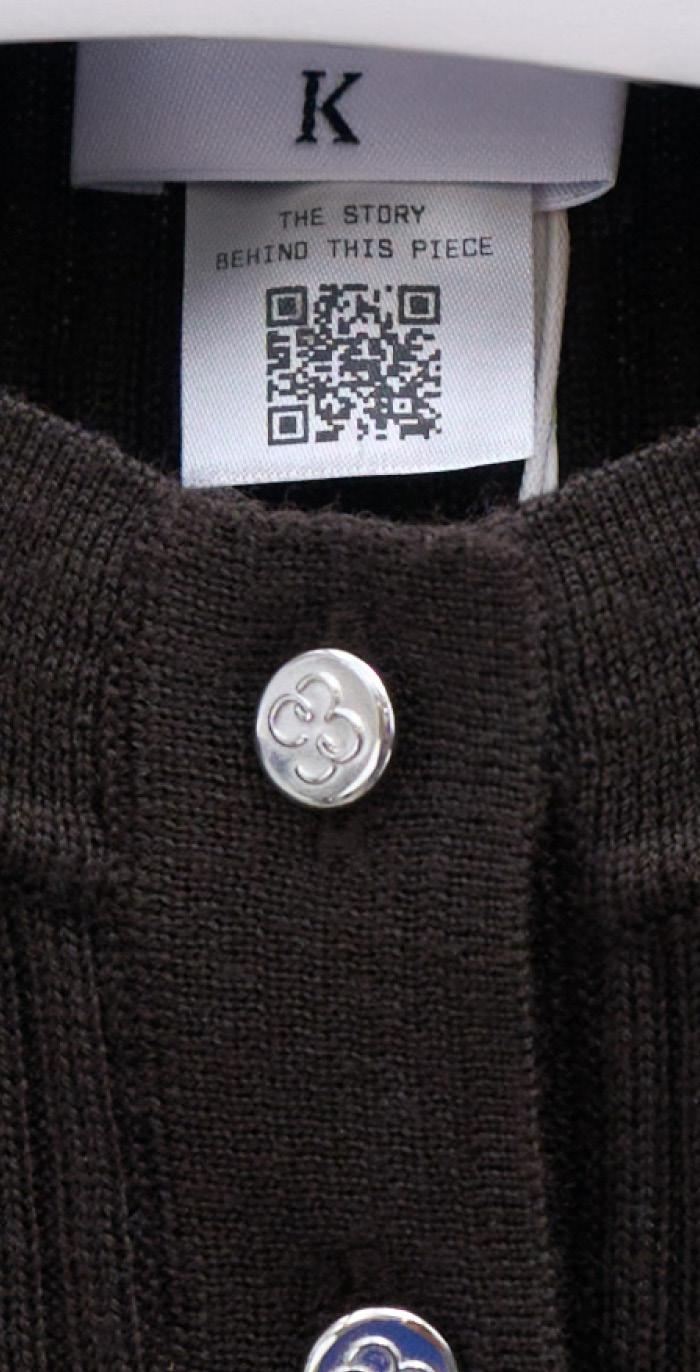
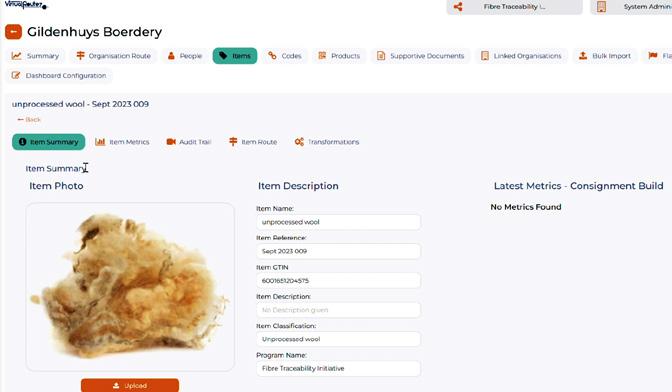
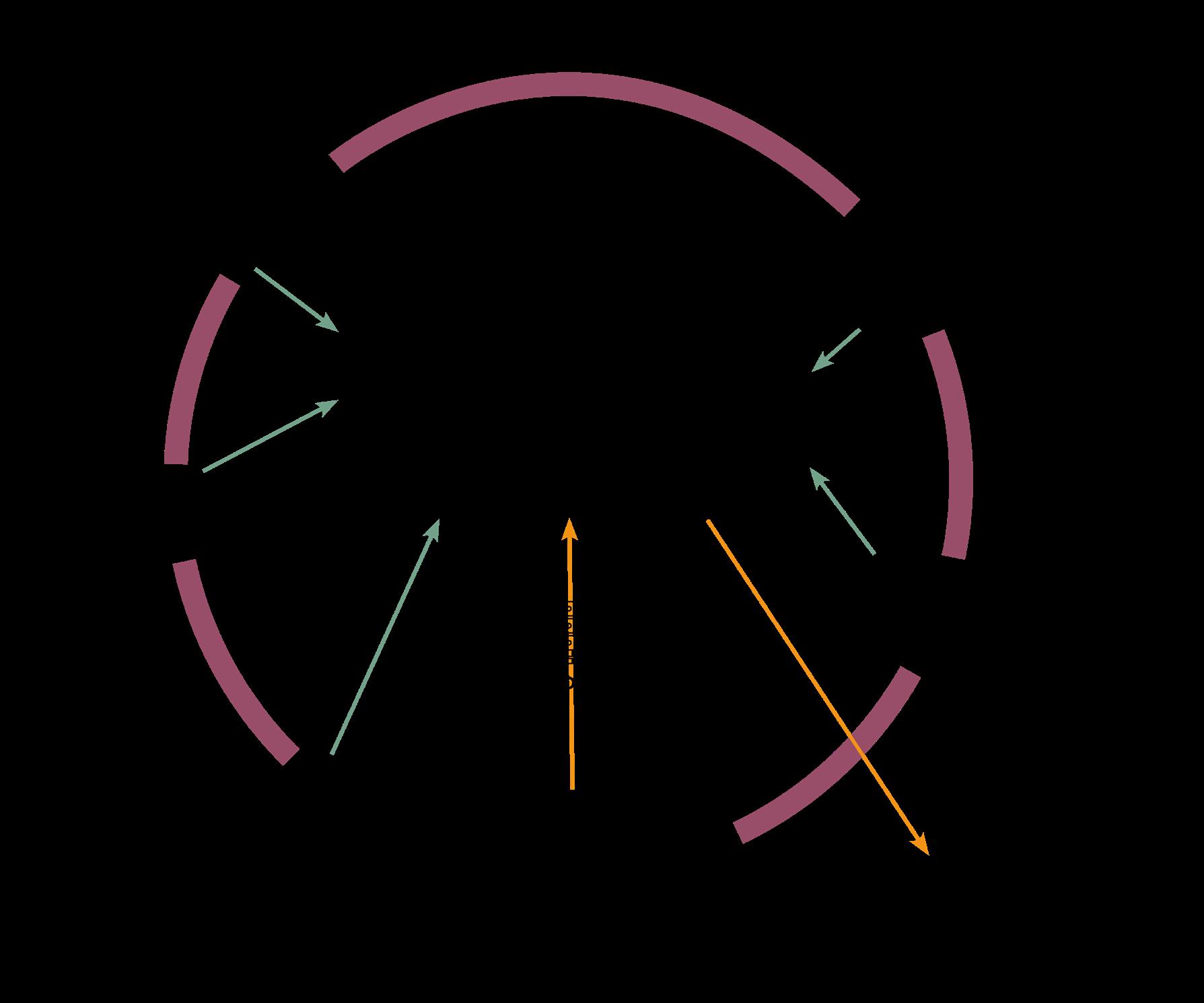
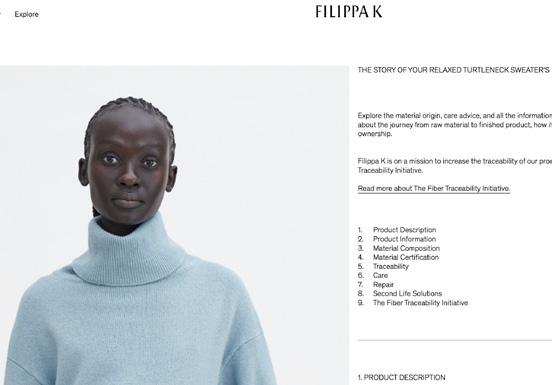
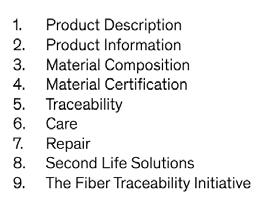
The Technical Solution
The Fiber Traceability Initiative uses GS1 Digital Link which is a standard that connects product information to the web through the QR code powered by GS1, scannable with a mobile phone.
1. Data is collected through the value chain using digital product identifiers captured in RFID tags1 and 2D codes (QR 2) to automate the recording of the production, movement and impact data at each datapoint.
2. When the QR code (GS1 Digital link – URL and a product ID) on the garment is scanned, a request is sent to a resolver. Generally,
The GS1 standard creates a uniform, competition-neutral, and global framework for product identification and labeling, ensuring interoperability between systems. The solution admits interoperability between the VirtualRouteZ digital platform and ERP 3 systems of suppliers, in alignment with GS1 standards and EU Digital Product Passports (DPP)4 require ments.
the resolver’s function is to request links to different data sources. In the Initiative’s beta version, the resolver is used to re-direct to a style-color-size static landing page, and the one data source is Virtual RouteZ platform.
3. The product’s specific data is retrieved and shown on-screen.
4. In the Initiative’s beta version, the customer is provided with a comprehensive view of the product’s journey, including Responsible Wool Standard certification. There are also brand recommendations on care, repair and resell.
In cases where the suppliers’ internal systems capability does not allow for an API, VirtualRouteZ provides bespoke datacapturing alternatives such as workstation hardware and software, and/or cloud-based templates. This enables the inclusion of suppliers regardless of where they are in their digitization journey.
1 Radio Frequency Identification (RFID) technology uses radio waves to identify people or objects.
2 A 2D code (two-dimensional barcode), stores information both horizontally and vertically, enabling it to hold more data than a traditional barcode. A QR code (Quick Response code) is an array of black and white squares or pixels set in a grid that stores data for a machine to read.
3 Enterprise resource planning (ERP) is a software system that helps you run your entire business, supporting automation and processes in finance, human resources, manufacturing, supply chain, services, procurement, and more.
4 The EU Digital Product Passport (DPP) is a tool aimed at enhancing transparency about a product’s environmental impact by offering relevant and comprehensive information about its lifecycle.
The Fiber Traceability Initiative meets consumers’ growing demand for transparency, as the solution makes it possible to verify the product journey, impact, and content.
The Initiative is on a journey towards fully digitized, automated, traceable, and transparent value chains. This first version is in line with the development of the Digital Product Passports, preparing all stakeholders for the upcoming EU legislation regarding value chain traceability requirements in general, and DPP in specific.
The Initiative facilitates companies’ compliance with the EU’s Textile Strategy and Eco-design Directive, including the implementation of DPP, a forthcoming EU requirement that affects nearly all products on the European market.
The Initiative’s solution is spearheading the ability of brands to successfully implement their Preferred Fibres and Materials (PFM) strategy. It is known as Integrated Value Chain Programme (IVCP) Protocol and is embedded in the VirtualRouteZ platform architecture.
Transparency and traceability enable predictability, which spurs new business models that promote sustainability. For instance, instead of reserving fabric for an upcoming collection, the brand can reserve fibers for several collections. This entails flexibility, optimizes production, and reduces waste.
Furthermore, interoperability contributes to
more coordination and efficiency, which in turn lowers costs and supports more sustainable market structures.
The traceability accessed through the Fiber Traceability Initiative provides many benefits to the brand, in this case Filippa K. By improving insight into the origins of raw materials, brands can better understand sourcing practices and animal welfare standards, while building stronger supplier relationships. Full supply chain visibility could open up opportunities for collaboration across various entities, supporting environmental and social improvements. Increased transparency could boost product value by offering insights into its journey and providing care, repair, and resell recommendations. This not only extends the garment’s lifespan but also helps the brand build stronger customer relationships and reach.
The suppliers use the same business language, the foundation for interoperability.
The Fiber Traceability Initiative’s level of innovation and adaptation to EU regulations puts its partners at the forefront, providing them with competitive advantages. By being onboarded on the journey towards digitized data sharing based on GS1 standards, the suppliers will become preferred business partners, gaining a competitive advantage.

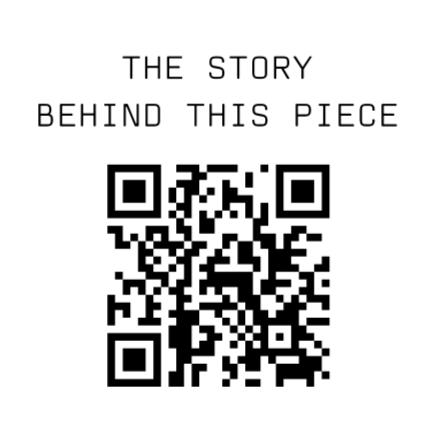
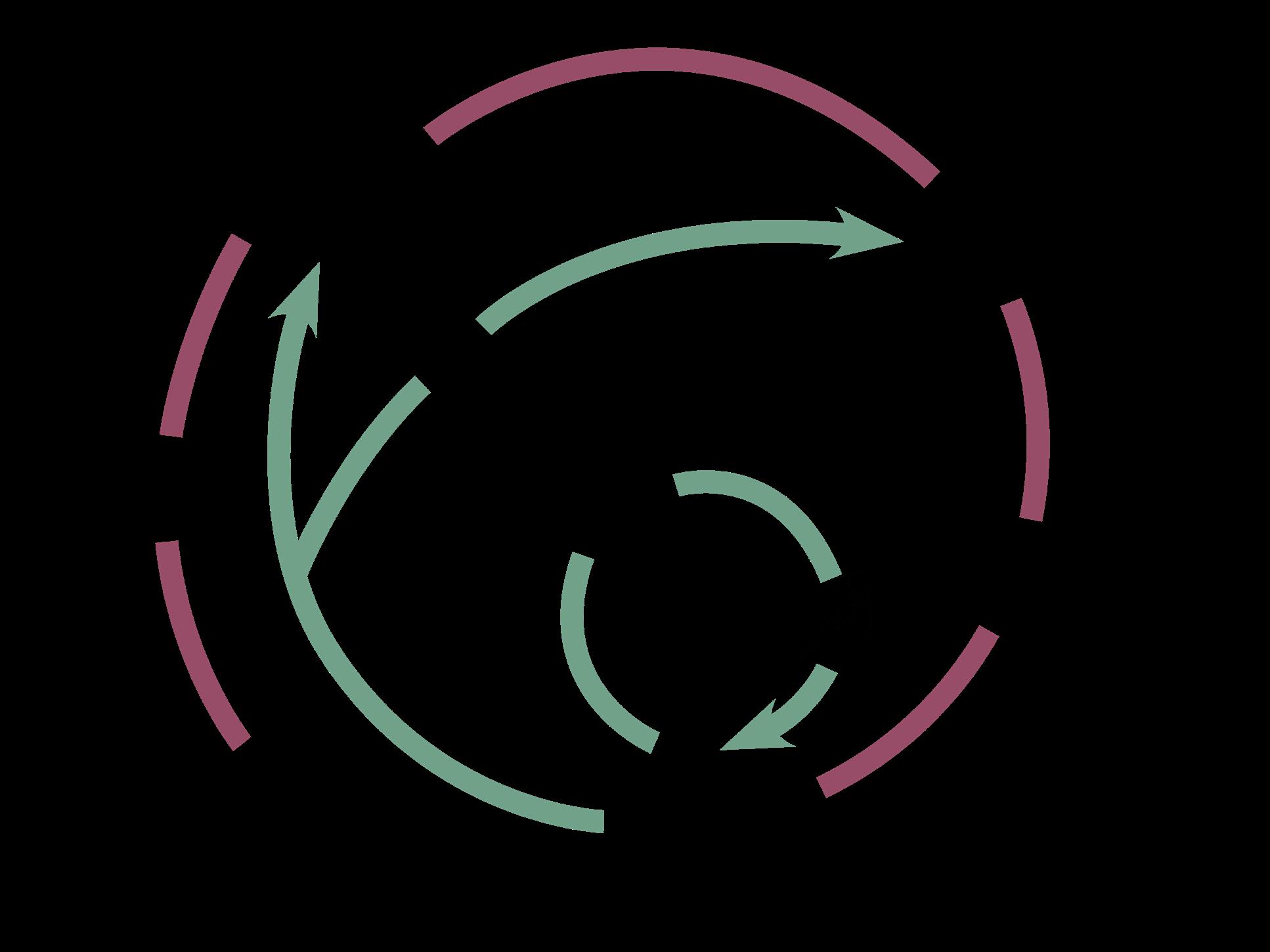
The Fiber Traceability Initiative paves the way for companies to adopt regenerative business models and achieve sustainable competitiveness while complying with EU legislation and implementing the Digital Product Passport.
While this is the first version of a digitally traceable wool value chain, the journey ahead is about full automatization and digitization through value chains in different industries. Also, the beyond-store aspect is yet an area to explore and develop.
And new ways of working mean new business opportunities. Brands, customers, and other stakeholders involved in products’ lifecycles beyond the store shelf (care, repair, reuse, remake, resell, recycle) will be rewarded. Potential gains in this area are stronger customer relations, less waste, new jobs, and eventually full circularity.
A standardized global solution will speed the fashion industry’s transition towards sustainable production and consumption. Working towards increased circularity, the Initiative takes important steps towards increased resource utilization and fulfillment of the 2030 Agenda for Sustainable Development.
By making sustainability data available, customers are guided to sustainable choices, and the solution creates an opportunity to build customer loyalty by enhancing the trust of customers.
The Initiative’s solution is designed in a way that enables scalability. The aim is to inspire greater transparency in fashion on a global level and to attract more interested brands and value chains, both in knitwear and woven fabrics.
www.fibertraceabilityinitiative.com


Stina Behrens
Project Manager at Future Materials, Axfoundation stina.behrens@axfoundation.com
Karolin Catela Product Specialist, GS1 Sweden karolin.catela@gs1.se


Anna Berne Vice President Product & Sustainability, Filippa K anna.berne@filippa-k.se
Heinrich Schultz Founder and CEO, VirtualRouteZ heinrich@virtualroutez.com
Axfoundation
Axfoundation is an independent, non-profit organization working practically and concretely towards building a sustainable society. Believing strongly in business as a driving force for change, projects are often initiated and run together with the private sector. Together with over 300 partners across sectors and industries Axfoundation tackles local and global sustainability challenges based on practical issues related to the things we buy, the food we eat and the resources we use.
Filippa K
Founded by celebrated Swedish fashion designer Filippa Knutsson in 1993, Filippa K has grown internationally to become a household name synonymous with Scandinavian style. Timeless silhouettes are re-interpreted within the context of modern life, with expert craftsmanship and attention to detail resulting in ready-to-wear collections for women and men.
With stores in key European cities such as Amsterdam, Copenhagen and Berlin, an ecommerce presence in over 70 markets, and over 200 employees across Europe, Filippa K continues its journey of global expansion guided by a mission of mindful consumption.
With a common digital business language for traceability in value chains, GS1 Sweden enables companies and industries to achieve sustainability, efficiency, and safety. GS1 creates the conditions to identify, collect, and share information seamlessly across the world. The scale and reach – national member organizations in 118 countries, more than 2 million user companies, and 10 billion transactions each day – help ensure that GS1 standards support systems and processes both globally and locally.
VirtualRouteZ
VirtualRouteZ (VRZ) provides innovative business solutions enabled by their technology. The VRZ platform is a global cloud-based infrastructure that is designed to provide forensically hard traceability and visibility (business intelligence) across an end-to-end industry value chain. It is commodity agnostic, meaning that Filippa K uses a single solution for all its products anywhere in the world. Designed to capture real data recorded in near real-time at supplier and farm level, it enables Filippa K to report on real sustainability impact and directly reward farmers with impact incentives.
Some companies or parts of industry have already invested in digitization. VRZ does not have the intention to replace or compete with any existing technology solutions, but rather interface with such systems or initiatives to maximize value.

©Axfoundation 2024
info@axfoundation.se www.axfoundation.se
Photo: Evelyn Del Carmen. Design: Design54.
Copyright: Axfoundation encourages the use, reproduction and dissemination of material in this document. Material may be copied, downloaded, and printed for private use, research, and teaching purposes, or for use in non-commercial products or services, provided that appropriate acknowledgement of Axfoundation and The Fiber Traceability Initiative as the source and copyright holder is given and that Axfoundation’s endorsements of users’ views, products and services are not implied in any way.
